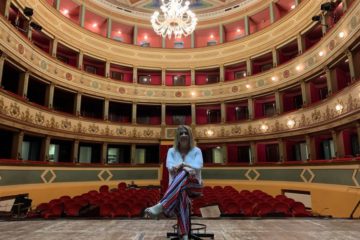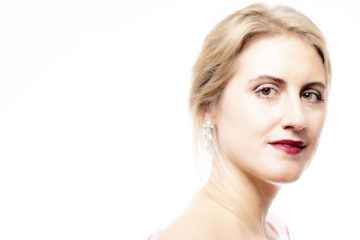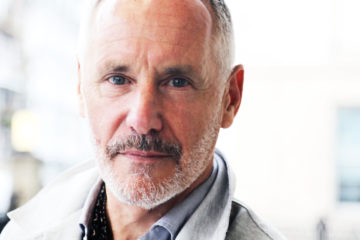Mezzo-soprano Daniela Mack is having one of those seasons that opera singers dream of: a run of a new opera that received rave reviews, role and house debuts at major opera houses, and the title role in Carmen at one of the great U.S. houses. I am so pleased that, despite her hectic schedule, Daniela was willing to answer a few of my questions about her current season, her background, and her love of the art form.
You’ve got some exciting things coming up yet this season! I see JFK in Montreal, Beatrice & Benedict at Seattle Opera, and Carmen at Opera Philadelphia. Are any of these house or role debuts? Are you particularly excited about any of them?
Yes, I’m so thankful that this season is particularly juicy and interesting for me! I’m in Montreal right now reprising Jackie in JFK, and making my house debut. It’s been amazing to revisit this beautiful and heartbreaking piece with most of the stellar cast who also created the roles alongside me in 2016. Singing it again with a little distance since the premiere has been such an eye-opening experience. Stepping into Jackie’s iconic shoes the first time around was scary and intimidating, but I now have a much deeper grasp of who she was and how to maneuver my way through her very painful yet hopeful emotional journey. The role is meaty and emotionally charged, and a real gift to sing!

Photo credit: Simon Pauly
I’ve been eyeing the role of Beatrice for about ten years. It’s rarely performed, so I am very happy to be singing my first one in Seattle, which will also be a house debut for me. Much Ado About Nothing is one of my favorite plays; Beatrice is a spitfire — so quick and funny, but definitely wiser and more savvy than an ingenue, which makes her enticing. I’m also doubly excited that Benedict, my sparring partner, will be my real-life husband!
Carmen at Opera Philadelphia will be a very special treat for me, too. I love the company and the wonderful and innovative work that they produce. I’m thrilled to be going back for one of my favorite roles!
Tell me about Elizabeth Cree, the new Kevin Puts opera. I’ve read nothing but rave reviews regarding your performance and the opera as a whole. How does being the first to perform a role compare to doing a role like Carmen?
The process of creating Elizabeth was a joy from start to finish, and I am totally hooked on contemporary opera. Having the chance to witness part of the creative process is truly incredible and humbling, especially when you add to the mix a dream-team like Kevin Puts/Mark Campbell — they create magic! They are both such lovely and giving artists, and very open to ideas and collaboration. The end result is absolutely tailor-made, feels organic and therefore driven by the performers, which is ideal for a piece as theatrical/cinematic as Elizabeth Cree. Most of my repertoire is standard bel canto, and it’s a wonderful inspiration to have my idols in my ear when I perform it. However, the beauty of being the first to perform something like Elizabeth is the freedom to express without any baggage attached. Nobody has a preconceived notion of what a new piece “should” sound like, beyond the expectation and hope that it will be great. This is liberating for a performer, and gives us more creative license than we might have with a piece that has a long legacy of tradition attached to it.
I can’t wait to see Elizabeth Cree at Chicago Opera Theater! How should I prepare for it? Is there anything I should know beforehand?
If you aren’t familiar with the novel, I won’t spoil anything for you! The story unravels at a very fast pace, and it feels as though you’re watching a movie with a lot of hidden clues to pick up. It will hook you and keep you guessing until the very end! There is nothing like it in the operatic repertoire (to my knowledge), which is, in part, why it’s such an exciting piece of theater.
Tell me a bit about your background. I know you were an Adler Fellow at San Francisco Opera, but what about before that? Did you grow up loving opera? Has singing always been a part of your life? Are you from a musical family?

Photo credit: Simon Pauly
My parents inadvertently developed my ear from a very early age. My mother tells me that she took me to the symphony and the ballet in a bassinet (sadly, I have no photographic evidence of that!) and there was always some music playing at home. My father was a great lover of classical music and classic musical theater. I have many memories of watching all of the Rodgers & Hammerstein film versions and singing every word together. He was also a pianist (though not a performer) and woke the whole family up every Saturday and Sunday with Beethoven’s Moonlight Sonata (which, in the moment, for a kid who just wanted to sleep in, was infuriating!). They both took me to see my first opera (La Traviata) when I was seven years old, and I loved everything about it — except the tragic end, which I didn’t understand, of course. I came home after that and shut myself in my room to pretend to sing like an opera singer. I played piano through high school and my teacher reserved the last fifteen minutes of each lesson for singing. We sang Latin ballads, musical theater, Italian art songs, and Disney songs. I think he realized how much I looked forward to that, so at fifteen, he recommended that I take voice lessons with a voice teacher. I didn’t decide to pursue it as career until I started looking at colleges. I spent six years studying at Louisiana State University, where I earned both of my degrees in voice. I was a very shy kid, and having music as a creative outlet absolutely brought me out of my shell and shaped who I am today.
What’s been the most challenging role you’ve take on? What about the most exhilarating production you’ve been a part of?
I think every new role comes with its own set of challenges, and stretches an artist in new and necessary ways. This certainly applies to both Jackie and Elizabeth, which are the newest roles I’ve taken on, and both require intense technical and emotional focus, given the subject matter. From a technical standpoint, even returning to a role that I know well and fit perfectly after several years presents challenges. I learned Angelina in Rossini’s La Cenerentola in school, for example, and sang it several times at the start of my career. When I came back to it several years later, I found that I had difficulty with new spots and felt stronger in others, which completely took me by surprise. The human voice is so sensitive and ever-changing, so singers need to know their instrument and be flexible enough to adjust accordingly. From an emotional standpoint, the most difficult role I’ve ever performed is Sister Helen in Dead Man Walking. I had an intensely visceral reaction to the piece and its content, and have never been more emotionally drained after rehearsals. Two productions are tied for most exhilarating: Elizabeth Cree in Philadelphia and Handel’s Partenope in San Francisco. They couldn’t be farther apart on the spectrum of opera in every sense, but both were phenomenal experiences because of the audience response and participation. The energy that an engaged audience provides is the fuel for a great performance, and in both cases, the support was certainly felt on stage by every performer.
Are there any great mezzo roles that you’re dying to sink your voice into?
Yes! So many! The ones at the top of the list are Charlotte in Werther, Handel’s Ariodante, Desdemona in Rossini’s Otello (and my bucket list role… Dolly Levi!).
What are you passionate about besides opera?
My family, namely my 2.5 year old daughter, gets every ounce of my passion and personal energy these days! I am humbled and amazed by her every day! She has taught me so much about life and the human condition in such a short time, and she is the light in my eyes. I am so fortunate to be able to watch her grow and help her navigate the world, and it absolutely informs what I do on stage as a performer for the better.
Is there an opera recording that you grew up listening to and/or have spent a lot of time with that stands out in your mind? For me, for instance, it was a recording of Pavarotti, Sutherland, and Milnes singing Rigoletto; I listened to it nonstop for months and I can’t imagine developing a love of opera without it.
I can’t think of just one specific opera recording, but there were a few recordings that stand out as having been on repeat during my youth: Placido Domingo’s De Mi Alma Latina (which I could probably still sing to you from memory), the best of Pavarotti (whose voice made me smile even before I thought opera was actually cool), and Piazzolla’s Libertango (one of my father’s absolute favorites). As an adult, I’ve spent a lot of time listening to Tatiana Troyanos, whose voice I love!
To finish, I’d like to ask a question I ask everyone: what is it about opera that touches your soul?
I love opera for the complete and massive art form that it is. It is all-encompassing, with its combination of story, drama, orchestra, scenic design, technology, and above all, the raw, un-amplified power of the human voice. It has the potential to be simultaneously grand and intimate, and runs the gamut of human emotion and experience. Personally, I’ve found a home in opera, and a way to let my inner voice speak through the music, but I first came to it as a wide-eyed spectator and it made an enormous impact on me. There is something magical about being in the audience and having a singer reach out and touch you with the purity and honesty of nothing but their sound. It’s the essential human connection and, when everything lines up just right, is as powerful as human touch.


